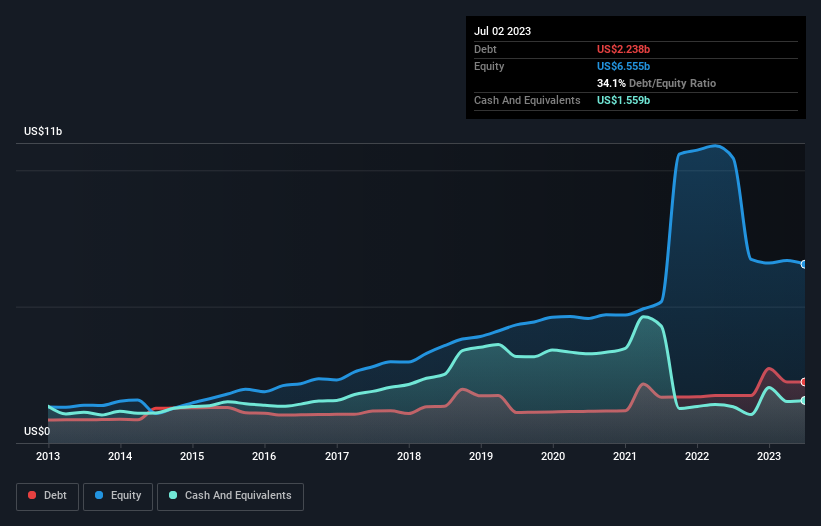
David Iben put it well when he said, 'Volatility is not a risk we care about. What we care about is avoiding the permanent loss of capital.' When we think about how risky a company is, we always like to look at its use of debt, since debt overload can lead to ruin. Importantly, Illumina, Inc. (NASDAQ:ILMN) does carry debt. But is this debt a concern to shareholders?
Why Does Debt Bring Risk?
Debt and other liabilities become risky for a business when it cannot easily fulfill those obligations, either with free cash flow or by raising capital at an attractive price. Ultimately, if the company can't fulfill its legal obligations to repay debt, shareholders could walk away with nothing. While that is not too common, we often do see indebted companies permanently diluting shareholders because lenders force them to raise capital at a distressed price. Of course, plenty of companies use debt to fund growth, without any negative consequences. The first step when considering a company's debt levels is to consider its cash and debt together.
Check out our latest analysis for Illumina
What Is Illumina's Net Debt?
The image below, which you can click on for greater detail, shows that at July 2023 Illumina had debt of US$2.24b, up from US$1.74b in one year. However, it also had US$1.56b in cash, and so its net debt is US$679.0m.

How Strong Is Illumina's Balance Sheet?
According to the last reported balance sheet, Illumina had liabilities of US$2.30b due within 12 months, and liabilities of US$2.92b due beyond 12 months. Offsetting this, it had US$1.56b in cash and US$758.0m in receivables that were due within 12 months. So its liabilities total US$2.90b more than the combination of its cash and short-term receivables.
Of course, Illumina has a titanic market capitalization of US$18.9b, so these liabilities are probably manageable. However, we do think it is worth keeping an eye on its balance sheet strength, as it may change over time. The balance sheet is clearly the area to focus on when you are analysing debt. But it is future earnings, more than anything, that will determine Illumina's ability to maintain a healthy balance sheet going forward. So if you want to see what the professionals think, you might find this free report on analyst profit forecasts to be interesting.
Over 12 months, Illumina made a loss at the EBIT level, and saw its revenue drop to US$4.5b, which is a fall of 4.9%. We would much prefer see growth.
Caveat Emptor
Over the last twelve months Illumina produced an earnings before interest and tax (EBIT) loss. To be specific the EBIT loss came in at US$172m. When we look at that and recall the liabilities on its balance sheet, relative to cash, it seems unwise to us for the company to have any debt. So we think its balance sheet is a little strained, though not beyond repair. Another cause for caution is that is bled US$224m in negative free cash flow over the last twelve months. So suffice it to say we do consider the stock to be risky. For riskier companies like Illumina I always like to keep an eye on whether insiders are buying or selling. So click here if you want to find out for yourself.
Of course, if you're the type of investor who prefers buying stocks without the burden of debt, then don't hesitate to discover our exclusive list of net cash growth stocks, today.
New: AI Stock Screener & Alerts
Our new AI Stock Screener scans the market every day to uncover opportunities.
• Dividend Powerhouses (3%+ Yield)
• Undervalued Small Caps with Insider Buying
• High growth Tech and AI Companies
Or build your own from over 50 metrics.
Have feedback on this article? Concerned about the content? Get in touch with us directly. Alternatively, email editorial-team (at) simplywallst.com.
This article by Simply Wall St is general in nature. We provide commentary based on historical data and analyst forecasts only using an unbiased methodology and our articles are not intended to be financial advice. It does not constitute a recommendation to buy or sell any stock, and does not take account of your objectives, or your financial situation. We aim to bring you long-term focused analysis driven by fundamental data. Note that our analysis may not factor in the latest price-sensitive company announcements or qualitative material. Simply Wall St has no position in any stocks mentioned.
About NasdaqGS:ILMN
Illumina
Provides sequencing- and array-based solutions for genetic and genomic analysis in the Americas, Europe, Greater China, the Asia Pacific, the Middle East, and Africa.
Excellent balance sheet with reasonable growth potential.
Similar Companies
Market Insights
Community Narratives



